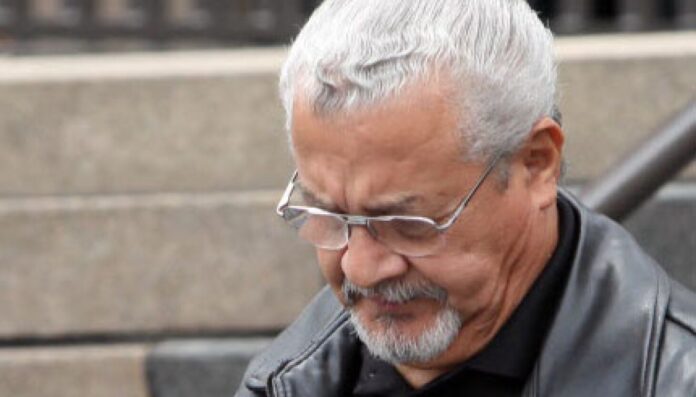Lawyers for a man who claims he was framed for murder by former Chicago Police detective Reynaldo Guevara see ominous signs for the future of wrongful conviction cases under new State’s Attorney Eileen O’Neill Burke.
Tuesday, the day after Burke was sworn in, Wilfredo Torres was set to take the stand in a post-conviction hearing in the 1990 murder of his friend, 15-year-old Peter Cruz. Nearly 35 years ago, Torres claims he identified Tyrece Williams as Cruz’s shooter after Guevara showed him Williams’ picture and told Torres to pick Williams out of a photo lineup, then threatened him and punched him in the gut when he refused.
The move by prosecutors came after an eight-year span where the State’s Attorney’s office under O’Neill Burke’s predecessor, Kim Foxx, that saw hundreds of convictions overturned based on misconduct by police and prosecutors. Witnesses have made similar recantations in nearly 50 cases where allegations against Guevara led to a conviction getting thrown out.
But this week, Assistant State’s Attorney Linda Walls, head of the State’s Attorney’s post-conviction unit, said Torres shouldn’t take the stand without consulting with a lawyer because the office would investigate him for potential perjury charges.
“I would be remiss … to not bring to the court’s attention the possibility of a person committing a Class 3 felony in court,” Walls told Judge Carol Howard at a hearing Thursday, adding that if Torres took the stand, she would ask that her office investigate his claims for potential prosecution.
“I don’t know what that decision may or may not be should the Class 3 felony be committed under oath,” Walls said. “But as an assistant state’s attorney, I cannot let a citizen commit a felony without having counsel.”
Torres hired firebrand defense attorney Jennifer Bonjean, who said the threat of charges was intended to intimidate recanting witnesses from coming forward.
“If my client comes into court and speaks truthfully about the misconduct or Ray Guevara, that it is in fact the state’s intention under this new administration, that they will investigate him for perjury and he will face imprisonment?” Bonjean asked the judge.
“Are we going back to the dark days of threatening recanters with imprisonment to keep people in prison longer?”
A spokeswoman for O’Neill Burke said the office would not comment on the pending case or whether the office would investigate any witness who recants their testimony for perjury. Howard set another hearing for Jan. 9.
Veteran Cook County defense attorney Kulmeet “Bob” Galhotra said witnesses will often take the stand and reverse their prior testimony before a grand jury, and that he has occasionally seen prosecutors bring charges after the trial. But in decades-old cases, a seven-year statute of limitations for felonies likely would have long lapsed, and proving the more recent, contradictory testimony was false would require a lot of prosecutorial effort.
“I think, especially where you have accusations of police misconduct, it would come off as pretty heavy handed,” Galhotra said, who said a judge in a post-conviction hearing would be able to judge which version of the testimony seemed more likely to be true.
“Going after those witnesses, at best, has the potential to really make (the public) question whether the office is really turning a page on this stuff.”
More convictions were overturned during Foxx’s two terms as State’s Attorney — more than 200 cases — than under any of her predecessors in the office, and rehabilitating Cook County’s reputation for wrongful convictions was a signature goal of her often-troubled administration.
Whether that pace continues under O’Neill Burke remains to be seen. During her closely fought Democratic primary race, O’Neill Burke was tagged for her role as the prosecutor in a juvenile court case where an 11-year-old boy was convicted based on a false confession. A former appeals court justice, O’Neill Burke often walked a fine line between critiquing flaws in the justice system and endorsing reforms.
In her first term, Foxx created a dedicated Conviction Integrity Unit, which she “re-branded” as the Conviction Review Unit following allegations of misconduct by the unit chief. In 2017, Foxx signed off on the first “mass exoneration” in Cook County history, vacating the convictions of 15 defendants whose cases were tainted by the involvement of a corrupt police unit whose lead officers were sentenced to prison for shaking down residents of the Ida B. Wells housing project.
Allegations of misconduct against Guevara have unwound at least 49 cases, said Williams’ attorney, Lyla Wasz-Piper of the Exoneration Project, with dozens of witnesses claiming that the homicide detective pushed them to make false identifications by threats or physical abuse. Prosecutors did not warn of potential perjury charges, nor launch any investigations of those witnesses, she said.
Torres’ story is similar to other witnesses to claim abuse by Guevara. In 1990, the 16-year-old Torres and 15-year-old Cruz were close friends, and Torres had been standing with Cruz when Cruz was attacked by a man with a dog, and then fatally shot. But in an affidavit sworn out earlier this year, Torres said Guevara showed him Williams’ picture, and threatened to throw Torres in jail if he didn’t pick Williams out of a lineup.
“I testified at trial … because I was young and scared,” Torres wrote in an affidavit. “I also feared that if I did not cooperate with the detectives they would pin a case on me, like they were making me do for someone else.”
Wasz-Piper said that Torres has little motive to lie now.
“Peter Cruz was his friend,” the attorney said. “Why would he come here from his home (out of state) at great expense, to help his friend’s killer?”
